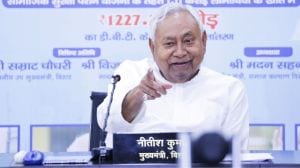Kashmir’s gunmakers fight to live
Guns of all makes and sorts may be booming in militancy-hit Kashmir, but the Valley’s traditional gun-making industry is struggling for...

Guns of all makes and sorts may be booming in militancy-hit Kashmir, but the Valley’s traditional gun-making industry is struggling for survival.
A ban on civilian licences since the rise of militancy in the early 1990s and the Centre’s curb on production quotas—as a security measure—have crippled any hope of growth, say those who run the Zaroo and Subhana gun factories, the two remaining units here.
The only hope now, they say, is the J&K government’s rehabilitation package for militancy-hit units or a policy change at the Centre.
‘‘This industry has suffered the worst after the 90s. Our units will not survive if the Centre does not change its policy and increase our production quota,’’ says Mohammad Yousuf, one of the co-owners of the Subhana factory.
‘‘Our production could have been 10 times more if not for the curbs,’’ says Mohammad Shafat Zaroo, manager of Zaroo factory and son of Ghulam Muhammad Zaroo, who built it.
Situated in Bandook Khar mohalla, in downtown Srinagar—a locality of ironsmiths who have traditionally specialised in gun-making—these factories manufacture 12-bore guns, a distant throwback from the Kalashnikovs that are generally favoured by the militants.
Yet, the two were forced to shut shop by the J-K government for a year in 1990 after militancy flared up in the Valley. They were later allowed to resume production, but now there are no buyers.
Clandestine sales, of course, is virtually impossible with police keeping a strict watch, conducting frequent checks of stocks and records. DIG, Kashmir, H K Lohia, says a constant vigil on these factories is essential because of the prevailing circumstances. But he also admits that ‘‘these weapons (12 bore rifles) have never been used in any militant action here.’’
Now both factories sell the traditional guns almost exclusively to buyers outside the state, but in restricted numbers.
The Subhana factory, operating since 1925, used to manufacture 700 guns every year. But for the last 20 years, they have been allowed to bring out only 300 guns annually. Established in 1940, Zaroo gets to manufacture 540 guns every year.
‘‘The manufacture of guns in our area is centuries old and all residents here were engaged in that work. But they have since had to find other employment… only the two units have survived,’’ says Basher Ahmed Zargar, an elder of Bandook Khar.
With its roots in Hazara, now in Pakistan, the gun-making tradition started flourishing in the Valley from the 18th Century. The 12-bore guns were once carried by forces of the Maharajas of Kashmir, say Bandook Khar residents. Today, they are mainly used by hunters, some security agencies, and even the police.
Both Zaroo and Subhana are family-run and registered as small-scale industrial units. Subhana, for instance, was passed on from Mohammad Subhan to his six sons and now the grandsons.
‘‘The raw material and expertise is easily available and a single unit can generate direct employment for 20 persons,’’ says Mohammad Shafat Zaroo. ‘‘We pleaded several times with the Central government to increase our quota. In Jammu, there are at least 32 gun-manufacturing units and their quota was increased by 20 per cent,’’ says Zaroo. Another way out, the gun-makers say, is to modernise. But Farooq Ahmad Zaroo, another son of Ghulam Mohammad Zaroo, fears that their licences would be revoked if they took that route.
‘‘An established industry is almost dead due to the apathy of both the State and Central governments,’’ says Zargar from Bandook Khar.
In fact, Secretary (Industries and Commerce) A Sahasranaman told The Indian Express that he wasn’t sure whether these gun-manufacturing units were registered with his department.
But Minister of State for Industris Raman Matoo agrees that ‘‘the demand for an increase in quota is valid, especially as there is an increase in the quota of gun-manufacturing units in Jammu.’’
‘‘There is complete ban on new entrepreneurs. But we will take up the issue of an increase in the quota for the existing units with the Central government,’’ says Matoo.



- 01
- 02
- 03
- 04
- 05




























